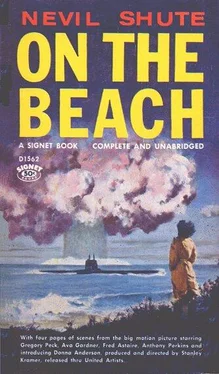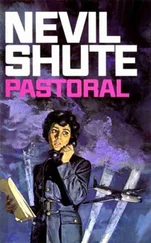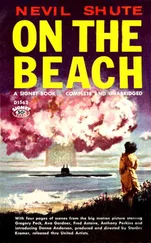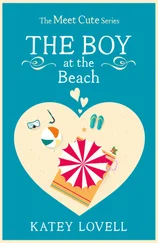She raised her eyes to his, smiling through her tears. "But now we’ve got it all together, on the same day. Aren’t we lucky?"
On the Friday Peter Holmes drove up to Melbourne in his little car, ostensibly to try and find a garden seat. He went quickly because he could not be away from home too long. He wanted to find John Osborne and to find him without delay; he tried the garage in the mews first, but that was locked; then he tried the C.S.I.R.O. offices. Finally he found him in his bedroom at the Pastoral Club; he was looking weak and ill.
Peter said, "John, I’m sorry to worry you. How are you feeling?"
"I’ve got it," said the scientist. "I’ve had it two days. Haven’t you?"
"That’s what I wanted to see you about," Peter said. Our doctor’s dead, I think—at any rate, he isn’t functioning. Look, John, Mary and I both started giving at both ends on Tuesday. She’s pretty bad. But on Thursday, yesterday, I began picking up. I didn’t tell her, but I’m feeling as fit as a flea now, and bloody hungry. I stopped at a café on the way up and had breakfast—bacon and fried eggs and all the trimmings, and I’m still hungry. I believe I’m getting well. Look—can that happen?"
The scientist shook his head. "Not permanently. You can recover for a bit, but then you get it again."
"How long is a bit?"
"You might get ten days. Then you’ll get it again. I don’t think there’s a second recovery. Tell me, is Mary very bad?"
"She’s not too good. I’ll have to get back to her pretty soon."
"She’s in bed, is she?"
Peter shook his head. "She came down to Falmouth with me this morning to buy moth balls."
"To buy what? "
"Moth balls. Napthalene—you know." He hesitated. "It’s what she wanted," he said. "I left her putting all our clothes away to keep the moths out of them. She can do that in between the spasms, and she wants to do it." He reverted to the subject he had come for. "Look, John. I take it that I get a week or ten days’ health, but there’s no chance for me at all after that?"
"Not a hope, old boy," the scientist said. "Nobody survives this thing. It makes a clean sweep."
"Well, that’s nice to know," said Peter. "No good hanging on to any illusions. Tell me, is there anything that I can do for you? I’ll have to beat it back to Mary in a minute."
The scientist shook his head. "I’m just about through. I’ve got one or two things that I’ve got to do today, but then I think I’ll finish it."
Peter knew he had responsibilities at home. "How’s your mother?"
"She’s dead," the scientist said briefly. "I’m living here now."
Peter nodded, but the thought of Mary filled his mind. "I’ll have to go," he said. "Good luck, old man."
The scientist smiled weakly. "Be seeing you," he replied. When the naval officer had gone he got up from the bed and went along the passage. He returned half an hour later a good deal weaker, his lip curling with disgust at his vile body. Whatever he had to do must be done today; tomorrow he would be incapable.
He dressed carefully, and went downstairs. He looked into the garden room; there was a fire burning in the grate and his uncle sitting there alone, a glass of sherry by his side. He glanced up, and said, "Good morning, John. How did you sleep?"
The scientist said briefly, "Very badly. I’m getting pretty sick."
The old man raised his flushed, rubicund face in concern. "My dear boy, I’m sorry to hear that. Everybody seem to be sick now. Do you know, I had to go down to the kitchen and cook my breakfast for myself? Imagine that, in a club like this!"
He had been living there for three days, since the death of the sister who had kept house for him at Macedon. "However, Collins the hall porter has come in now, and he’s going to cook us some lunch. You’ll be lunching here today?"
John Osborne knew that he would not be lunching anywhere. "I’m sorry I can’t today, Uncle. I’ve got to go out."
"Oh, what a pity. I was hoping that you’d be here to help us out with the port. We’re on the last bin now—I think about fifty bottles. It should just see us through."
"How are you feeling yourself, Uncle?"
"Never better, my boy, never better. I felt a little unsteady after dinner last night, but really, I think that was the Burgundy. I don’t think Burgundy mixes very well with other wines. In France, in the old days, if you drank Burgundy you drank it from a pint pot or the French equivalent, and you drank nothing else all evening. But I came in here and had a quiet brandy and soda with a little ice in it, and by the time I went upstairs I was quite myself again. No, I had a very good night."
The scientist wondered how long the immunity from radioactive disease conferred by alcohol would last. So far as he was aware no research had yet been done upon that subject; here was an opportunity, but there was now nobody to do it. "I’m sorry I can’t stay to lunch," he said. "But I’ll see you tonight, perhaps."
"I shall be here, my boy, I shall be here. Tom Fotherington was in last night for dinner, and he said that he’d be coming in this morning, but he hasn’t shown up. I hope he isn’t ill."
John Osborne left the club and walked down the treelined street in a dream. The Ferrari was urgently in need of his attention and he must go there; after that he could relax. He passed the open door of a chemist’s shop and hesitated for a moment; then he went in. The shop was unattended and deserted. In the middle of the floor was an open packing case full of the little red cartons, and a heap of these had been piled untidily upon the counter between the cough medicines and the lipsticks. He picked up one and put it in his pocket, and went on his way.
When he pushed back the sliding doors of the mews garage the Ferrari stood facing him in the middle of the floor, just as he had left it, ready for instant use. It had come through the Grand Prix unscratched, in bandbox condition. It was a glorious possession to him still, the more so since the race. He was now feeling too ill to drive it and he might never drive it again, but he felt that he would never be too ill to touch it and to handle it and work on it. He hung his jacket on a nail, and started.
First of all, the wheels must be jacked up and bricks arranged under the wishbones to bring the tires clear of the floor. The effort of manoeuvring the heavy jack and working it and carrying the bricks upset him again. There was no toilet in the garage but there was a dirty yard behind, littered with the black, oily junk of ancient and forgotten motorcars. He retired there and presently came back to work, weaker than ever now, more resolute to finish the job that day. He finished jacking up the wheels before the next attack struck him. He opened a cock to drain the water from the cooling system, and then he had to go out to the yard again. Never mind, the work was easy now. He detached the terminals from the battery and greased the connections. Then he took out each of the six sparking plugs and filled the cylinders with oil, and screwed the plugs back finger tight.
He rested then against the car; she would be all right now. The spasm shook him, and again he had to go out to the yard. When he came back evening was drawing near and the light was fading. There was no more to be done to preserve the car he loved so well, but he stayed by it, reluctant to leave it and afraid that another spasm might strike him before he reached the club.
For the last time he would sit in the driving seat and handle the controls. His crash helmet and goggles were in the seat; he put the helmet on and snugged it down upon his head, and hung the goggles round his neck beneath his chin. Then he climbed into the seat and settled down behind the wheel.
It was comfortable there, far more so than the club would be. The wheel beneath his hands was comforting, the three small dials grouped around the huge rev counter were familiar friends. This car had won for him the race that was the climax of his life. Why trouble to go further?
Читать дальше












